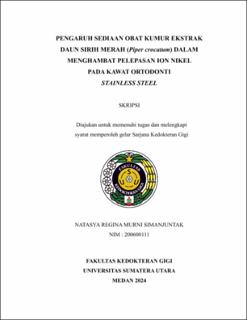| dc.description.abstract | Orthodontic treatment takes a long time, cause wire contact with the oral
environment, causing corrosion. One factor that triggers corrosion is the use of
mouthwash. Red betel leaves (Piper crocatum) contain secondary metabolites, one of
which is tannin, which functions to inhibit the corrosion process. This type of research
is laboratory experimental. The sample for this study was a round stainless steel
orthodontic wire with a diameter of 0.016 inches and a length of 5 cm. The samples
were divided into 4 groups, orthodontic wire immersed in artificial saliva (group 1),
chlorhexidine 0.2% mouthwash (group 2), Total Care mouthwash (group 3), and red
betel leaf extract 2% mouthwash (group 4). All wires immersed in all groups of
solutions were stored in an incubator at a temperature of 37oC. The aim of this study
was to determine the amount of nickel ions released from stainless steel orthodontic
wires in group 1, group 2, group 3, and group 4 for subgroups with soaking times of 7,
14, and 21 days. The amount of nickel ion release was measured using the ICP-OES.
The results showed that the entire group had significant One-way ANOVA and Posthoc
LSD test results on the effect of ingredients and time (p≤0.05). The highest ion
release was in group 2 for all subgroups with mean ion release of 0.0617±0.00115,
0.0579±0.00017, and 0.0552±0.00077. It can be concluded that the amount of release
of nickel ions immersed in group 4 is lower than group 2 and group 3. | en_US |


